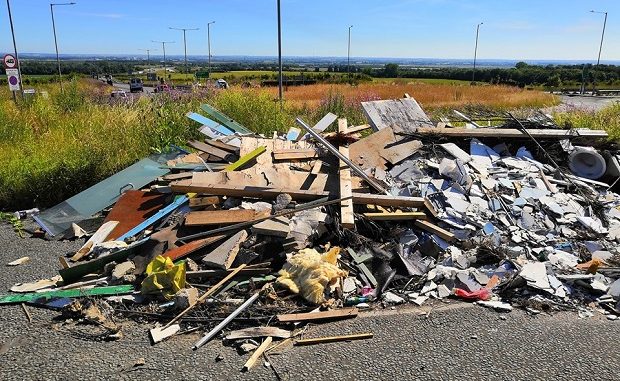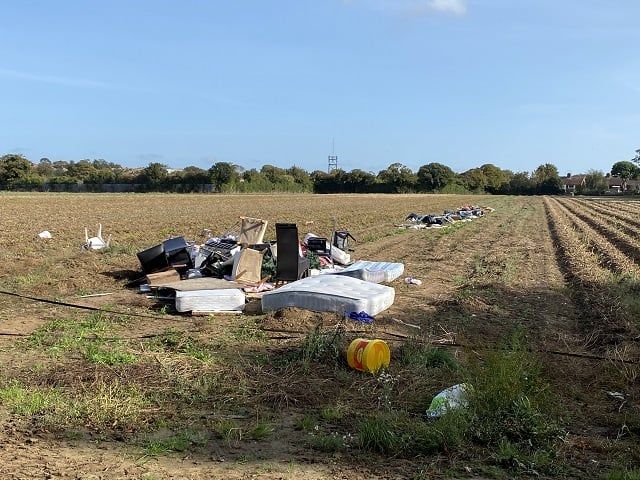
Newly-released figures from the government Department for Environment, Food and Rural Affairs (Defra) show there were more than one million incidents of fly-tipping on public land across the country in the last year – and more than 100,000 in the South East alone.
Councils in England dealt with 1.08 million fly-tipping incidents in 2022/2023, though these figures only account for waste illegally dumped on public land that has been reported to the authorities.
The mass of fly tipped waste on public land is actually a decrease of 1% from the 1.09 million reported in 2021/22.
In 2022/23, 60% of fly-tips involved household waste. Total incidents involving household waste were 653,000 in 2022/23, a decrease of 3% from 671,000 incidents in 2021/22.
Representing around 27,000 rural businesses across England and Wales, the Country Land & Business Association (CLA) believes these figures only tell a fraction of the story.
Many fly-tipping incidents occur on privately-owned land, painting an even more damaging picture of the financial burden and environmental impact fly-tipping brings. One CLA member is so badly affected he pays £50,000 a year to clear up waste.
Meanwhile the figures also show a 19% drop in the number of fixed penalty notices issued.
Data for Thanet
Data for Thanet shows there were 2535 fly tipping incidents recorded for the year with the council taking action on 1070 occasions. There were 98 Fixed Penalty Notices recorded and Thanet council carried out 426 investigations.
The authority sent six warning letters and 81 statutory notices but did not bring any prosecutions.

Last October voluntary tree warden Karen McKenzie launched a petition to try and force a change regarding the clearance of fly tipping from farmland sites.
The Broadstairs resident and artist says the burden of removing illegally dumped waste should not lie with the farmland owner but should be contributed to by local government.
She said: ”It is time for the law to be changed. Farmers should not have to pay for cleaning up what is a wider societal problem.
“All layers of government where we pay taxes could perhaps contribute to a scheme that would compensate farmers who have to clear up after these environmental vandals who think they are above the law.
“If we can’t solve this problem then at least the farmers shouldn’t have to pick up the bill.”
Karen was prompted to set up the petition after seeing two fly-tips in the same place on land behind St Peter’s churchyard.
CLA South East represents thousands of farmers, landowners and rural businesses, including in Kent, and says the figures do not show the ‘mass scale’ of dumping on private land such as farms.

Regional Director Tim Bamford said: “These fly-tipping figures barely scratch the surface of a crime that’s blighting rural communities, with incidents on private land going unrecorded on a mass scale.
“Farmers and landowners bear the cost of removing rubbish and they pay on average £1,000 to remove waste. This is not a victimless crime – in some cases they have paid up to £100,000 to clear up other people’s mess or risk facing prosecution themselves.
“It’s not just litter blotting the landscape, but tonnes of household and commercial waste which can often be hazardous – even including asbestos and chemicals – endangering farmers, wildlife, livestock, crops and the environment.
“While courts can sentence offenders to prison or unlimited fines, prosecutions are rare and criminals clearly do not fear the system. We are calling for local authorities to help clear fly-tipping incidents on private as well as public land, while the various enforcement agencies must be properly trained and resourced.
“Without more progress farmers, not the criminals, will continue to pay the price.”

Kent County Councillor Barry Lewis (Labour) is the shadow Cabinet member for environment.
He said: “I warned KCC officers that the charging for non-household waste brought in during 2019 would lead to a substantial increase in fly tipping in the county.
“Unfortunately my fears have been proven correct. I am glad the government has over-ruled KCC (and other councils) and has made them scrap the charges.
“I urge Thanet and Kent councils to make a more determined attempt to prosecute as this deterrent has only been used in a handful of cases.
“As shadow Cabinet member for environment at KCC this is a local Labour Party priority.”
Dealing with fly-tips
Thanet council says it endeavours to act promptly to investigate when a fly-tip is reported and the waste is removed as quickly as possible to prevent further items being dumped at the same spot
There is CCTV in known hotspots across the district. Fly-tipping can lead to a £400 fixed penalty notice or a criminal prosecution and up to five years in prison.
If a resident sees any fly-tipping in the district, they are asked to report it via the council’s online form. There is also an online map which shows existing fly-tipping reports which TDC is in the process of investigating.
More information is available on the council’s website.

